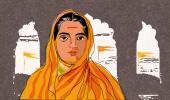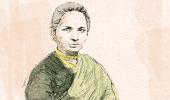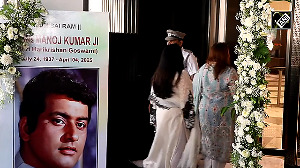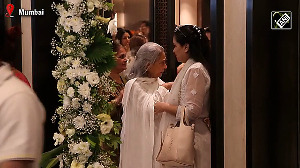This Women's Day, we honour Justice Anna Chandy, Justice M Fathima Beevi, and Justice Leila Seth -- pioneering leaders who broke barriers in India's legal profession as they championed justice, equality and women's rights.

On International Women's Day, we celebrate the extraordinary women we admire -- those whose incredible contributions have shaped the world and broken barriers for future generations.
Today, we honour the pioneering journeys of three remarkable women in India's legal history: Justice Anna Chandy, Justice M Fathima Beevi and Justice Leila Seth. Each of them not only shattered glass ceilings in the judiciary but also championed justice, equality and women's rights, leaving behind a powerful legacy that continues to inspire.
Each of these three women defied societal norms, faced challenges head-on and worked relentlessly to create a more just and equal society.
This Women's Day, we celebrate their courage, achievements and the indelible marks they have left on India's legal landscape, inspiring us all to continue striving for a more inclusive future.

Justice Anna Chandy
Justice Anna Chandy made history as the first female judge in India and the first woman to be appointed to a high court; she served on the Kerala high court from 1959 to 1967.
Her path-breaking work in law and advocacy for women’s rights continues to influence and inspire.
Justice Chandy's journey wasn't easy but she was determined to overcome every obstacle.
In 1926, she became the first woman in Kerala to earn a law degree with distinction from the Government Law College in Trivandrum.
She began practising law in 1929, specialising in criminal law, and quickly earned respect for her sharp mind and commitment to justice.
But Justice Chandy was more than just a legal professional; she was a passionate advocate for women's rights. She believed in the power of education, independence and equality for women.
Through her publication, Shrimati, she addressed not only home management and health but also the struggles women faced, such as widow remarriage and the unfair treatment of farmworkers who were, among other things, paid poor wages.
She used her platform to highlight the issues that often went unnoticed, giving women a voice where they had none.
Justice Anna also worked relentlessly for women's right to work.
She fought for women to be included in government jobs and played a key role in the movement that abolished laws preventing women from entering public service.
She was one of the first to demand reservations for women in government jobs.
Justice Chandy also challenged outdated laws like the exemption of women from the death penalty, showing her commitment to equality for all.
Justice Anna Chandy's life was defined by her unwavering belief in justice and equality, her courage and her advocacy for women's rights.

Justice M Fathima Beevi
Justice M Fathima Beevi made history as the first woman to be appointed as a judge in the Supreme Court of India and the first Muslim woman to hold such a prestigious judicial position.
Born in 1927 in Kerala, Justice Beevi was encouraged by her father to pursue law, a choice that would change the course of her life.
In 1950, she made waves by becoming the first woman to top the Bar Council exam, earning a gold medal.
She started her legal career in Kerala and gradually rose through the ranks. By 1974, she became a district and sessions judge and, in 1980, she joined the Income Tax Appellate Tribunal.
But her most remarkable achievement came in 1989 when she was appointed as the first woman judge to the Supreme Court of India.
Her appointment was more than just a personal triumph; it shattered barriers for women in India and opened doors for future generations of women to enter the legal field.
Justice Beevi's career wasn’t just about breaking glass ceilings -- it was about advocating for justice and equality, shaping laws and standing as a beacon of hope for many.
Even after her retirement in 1993, she continued to serve the nation, becoming a member of the National Human Rights Commission and later serving as the governor of Tamil Nadu.
In 2023, she was honoured with the Kerala Prabha Award and, in 2024, she was posthumously awarded the Padma Bhushan.
Justice M Fathima Beevi's legacy is a powerful reminder of what women can achieve when they push past barriers. Her life is a testament to the power of determination, paving the way for future women leaders to follow in her footsteps.

Justice Leila Seth
Justice Leila Seth made history as the first woman to be appointed as a judge of the Delhi high court, a groundbreaking achievement that paved the way for other women to follow.
Her career continued to reach new heights when she became the first woman Chief Justice of a state high court.
Born on October 20, 1930, in Lucknow, Justice Seth's journey began in an unexpected way -- working as a stenographer in Kolkata after school.
After marrying Prem Seth, she moved to London, where she enrolled in law classes.
At 27, she stunned everyone by becoming the first woman to top the prestigious London Bar exam.
Justice Seth started her legal career in 1959 and quickly earned a reputation for her exceptional skills, handling complex cases at the Patna high court and eventually the Supreme Court.
Her groundbreaking appointment as a judge in 1991 marked a pivotal moment in Indian legal history and, in 1992, she shattered another ceiling as the first woman chief justice of the Himachal Pradesh high court.
Beyond the courtroom, Justice Seth was deeply committed to human rights, women's rights and LGBT rights, leading important reforms like the campaign for daughters' inheritance rights in the Hindu Succession Act.
She also played a vital role in the Justice Verma Commission, which reformed rape laws after the 2012 Delhi gang rape case, ensuring that women's safety was prioritised in India's legal system.
Justice Leila Seth's legacy is a powerful reminder of the incredible strength, courage, and determination of women. Her life’s work continues to inspire us all to challenge the status quo and pursue our dreams, no matter the obstacles.
Image credits
Justice Anna Chandy: Kind courtesy All India Mahila Congress/Twitter
Justice M Fathima Beevi: ANI Photo
Justice Leila Seth: Kind courtesy Nikhil Kanekal/Wikimedia Commons
Sources: Bar and Bench, Wikipedia, NDTV, Drishti Judiciary, Career India
Women We Admire










 © 2025
© 2025